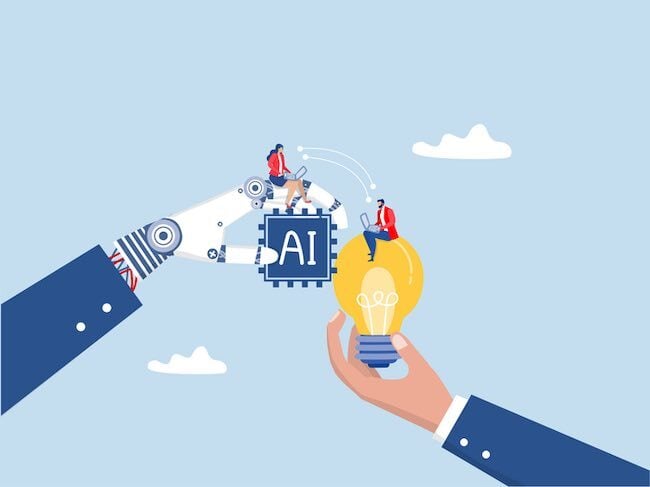
It’s hard to find an industry that isn’t benefitting from Artificial Intelligence (AI) today. Language services is no different with AI helping businesses communicate in a number of ways, some of them visible and some of them working away behind the scenes.
As a Language Service Provider (LSP), we work with AI on a daily basis to make our client’s needs become a reality. We see the advances in AI tech benefit how industries operate, allowing for faster, more accurate, and more scalable communication in virtually any language.
From real-time speech recognition to text translation and multilingual chatbots, AI is streamlining operations, enhancing customer experiences, and enabling businesses to expand globally like never before.
Here's our round up of the industries that are getting the most out of the AI revolution.
E-Commerce and Retail
The e-commerce industry is maybe one of the most visible winners when it comes to AI translation.
If you’re a retailer, as online shopping continues to expand across borders, you must cater to customers who speak a variety of languages.
AI translation tools allow product descriptions, customer reviews, shipping details, and customer support content to be instantly translated.
Platforms like Amazon have integrated AI translation to help sellers localize listings. This not only improves customer trust and experience but also boosts sales by making products more accessible to non-English speaking markets.
AI-driven chatbots also enable real-time multilingual customer support, reducing friction and improving satisfaction.
Healthcare and Life Sciences
In healthcare, clear communication can be a matter of life and death. AI translation is playing a vital role in improving accessibility for non-native speakers, especially in hospitals and clinics that serve diverse populations.
Medical professionals can now access AI-driven tools to translate patient intake forms, medical histories, treatment instructions, and discharge papers with greater speed and accuracy than ever before.
Pharmaceutical companies and researchers also benefit from AI translation when sharing research findings or regulatory documents across different regions.
AI helps maintain consistency with local languages and regulations when spreading scientific knowledge globally.
Legal and Compliance
Legal documents are often filled with complex jargon, making them challenging to translate. However, AI translation tools can cut through difficult terminology and are helping law firms and international companies streamline the translation process.
Contracts, court rulings, intellectual property documents, and compliance materials can now be translated faster and with fewer errors, improving efficiency and reducing costs.
While human oversight is still essential, AI allows legal teams to process and review large volumes of multilingual documents quickly, making it easier to support international legal needs.
Travel and Tourism
The travel and tourism industry thrives on the language barriers being minimized. Whether it’s a hotel welcoming international guests or a travel platform catering to tourists worldwide, AI translation makes it easier to serve customers in their native languages.
From booking websites and travel itineraries to restaurant menus and tourism guides, AI helps localize content to enhance the user experience. Real-time translation apps, powered by speech and image recognition, also help travellers navigate foreign destinations, improving satisfaction and safety.
Airlines and customer service agents increasingly use AI-driven chat and voice translation to handle inquiries, resolve issues, and provide multilingual support thereby reducing wait times and improving brand loyalty.
Media and Entertainment
Global audiences consume more digital content than ever before, and AI translation is key to making that content accessible. Streaming platforms use AI to generate subtitles and dubbed audio in multiple languages, allowing TV shows, movies, and documentaries to reach new markets quickly and cost-effectively.
Gaming companies also take advantage of AI translation to localize in-game text, dialogue, and user interfaces. This creates immersive experiences for players around the world without the lengthy delays associated with traditional localization efforts.
Even news organizations and social media platforms are using AI to translate articles, comments, and posts so they can be more easily consumed by a global audience.
Education and E-Learning
Online learning platforms have surged in popularity, and many are using AI translation to expand into new markets.
Educational providers can now offer courses and instructional videos in dozens of languages using automated translation.
This levels the playing field for students worldwide and helps institutions attract international learners.
Instructors can also benefit from real-time speech translation during lectures or webinars, and multilingual chatbots help non-native speakers receive support and navigate online learning environments with ease.
The Future: Increased Industry Accuracy
While AI translation has come a long way, the next frontier lies in customization for accuracy in specific sectors. Industry-specific models that understand jargon, tone, and cultural nuances are being developed to make AI more contextual to your industry and your business.
As large language models continue to improve, the barrier to global communication is shrinking. Whether you're a solo entrepreneur selling handmade goods overseas or a multinational corporation managing complex international operations, AI translation technology is becoming an indispensable tool.
If you’re in an industry that could benefit from emerging technology for your localization needs, we’d love to talk to you. Consultations are free and there’s no obligation.
You’re in safe hands with us as we’re ISO 17100 and ISO 9001 compliant, have over twenty years of professional translation experience, and have earned the trust of organizations around the world.






